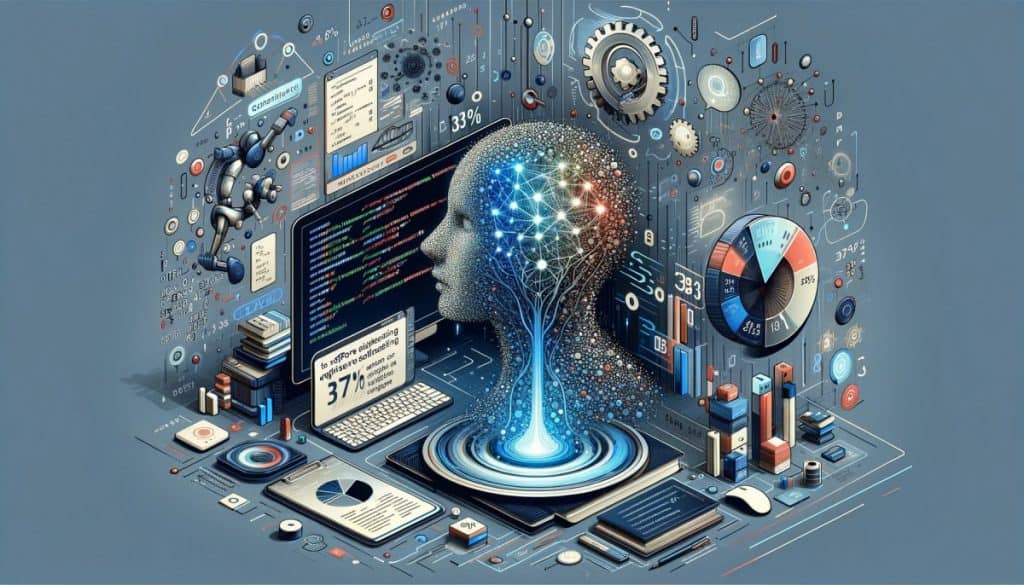Capgemini Report Predicts 37% of Software Code Will Soon Be Created with Generative AI Assistance


In Brief
Capgemini Research Institute’s report claims that around 37% of the software codes will be generated with assistance from generative AI by 2026.

Around 37% of the software codes will be generated with assistance from generative AI by 2026, and the generative AI tools are poised to elevate time savings for software engineering from 15% to an impressive 43% within the next three years, as highlighted in the latest report from the Capgemini Research Institute titled “The Art of Software: the new route to Value creation across industries.”
In the ever-evolving landscape of business, the software takes center stage — poised to redefine the next era and organizations are anticipating a substantial surge in their software-based revenue, projected to reach 29% by 2030, a remarkable leap from the 7% recorded in 2022, the report said.
At the forefront of this software-led transformation is generative AI, emerging as a key co-pilot to expedite the development lifecycle.
Fueled by the escalating demand for connected and intelligent products and services, organizations are increasingly turning to generative AI technologies to assist engineers and propel the rapid delivery of software code.
The study reveals a compelling trend, with seven in 10 organizations expressing their intent to integrate generative AI into their software engineering processes over the next year.
Notably, only 28% of surveyed organizations have stated their reluctance to incorporate generative AI to aid software engineering in the next 12 months.
Generative AI – a Crucial Tool for Software Engineers
Generative AI is gaining prominence as a crucial tool utilized by software engineers across the entire lifecycle. From conducting business needs analysis and crafting user stories to providing assistance in writing, optimizing, completing, testing, debugging, and monitoring software code, generative AI has become an integral part of the development process.
Moreover, the study reveals a significant trend in the adoption in software engineering. Presently, 30% of organizations are actively experimenting with this technology to enhance their software development practices.
Looking ahead, 42% of organizations have plans to incorporate into their workflows within the next 12 months. The evolving landscape underscores the increasing recognition of generative AI as a valuable asset in the arsenal of tools wielded by software engineers, to shape the future of software development.
Thoughtworks, a technology consulting firm, revealed the promising outcomes of recent experiments delving into the integration of tools like ChatGPT and GitHub Copilot throughout the software development lifecycle.
According to the firm, the results of these experiments demonstrate a notable 10–30% increase in productivity, marking a significant role in the software development landscape. However, the extent of productivity gains is contingent on three critical factors.
Firstly, developer experience plays a pivotal role, as engineers must possess the knowledge to articulate effective requests and evaluate output without compromising quality.
Secondly, proficiency with such tools is highlighted as an essential component. Users are required to not only master the art of crafting effective prompts but also to understand the nuances of these tools, knowing precisely when and how to leverage them without succumbing to distractions.
Lastly, the effectiveness of generative AI is contextual, with its optimum performance observed in well-defined problem domains. As complexity expands, the likelihood of driving substantial productivity gains diminishes.
Overall, the trajectory of software development is steering toward a future where generative AI becomes an ally for software engineers, and it may redefine the landscape of software development in the coming years.
Disclaimer
In line with the Trust Project guidelines, please note that the information provided on this page is not intended to be and should not be interpreted as legal, tax, investment, financial, or any other form of advice. It is important to only invest what you can afford to lose and to seek independent financial advice if you have any doubts. For further information, we suggest referring to the terms and conditions as well as the help and support pages provided by the issuer or advertiser. MetaversePost is committed to accurate, unbiased reporting, but market conditions are subject to change without notice.About The Author
Kumar is an experienced Tech Journalist with a specialization in the dynamic intersections of AI/ML, marketing technology, and emerging fields such as crypto, blockchain, and NFTs. With over 3 years of experience in the industry, Kumar has established a proven track record in crafting compelling narratives, conducting insightful interviews, and delivering comprehensive insights. Kumar's expertise lies in producing high-impact content, including articles, reports, and research publications for prominent industry platforms. With a unique skill set that combines technical knowledge and storytelling, Kumar excels at communicating complex technological concepts to diverse audiences in a clear and engaging manner.
More articles

Kumar is an experienced Tech Journalist with a specialization in the dynamic intersections of AI/ML, marketing technology, and emerging fields such as crypto, blockchain, and NFTs. With over 3 years of experience in the industry, Kumar has established a proven track record in crafting compelling narratives, conducting insightful interviews, and delivering comprehensive insights. Kumar's expertise lies in producing high-impact content, including articles, reports, and research publications for prominent industry platforms. With a unique skill set that combines technical knowledge and storytelling, Kumar excels at communicating complex technological concepts to diverse audiences in a clear and engaging manner.





















































